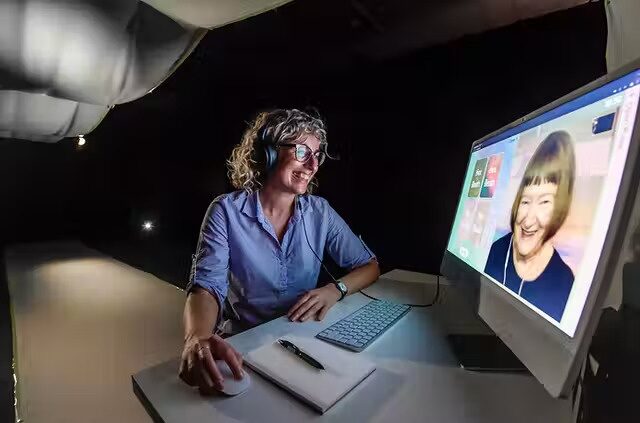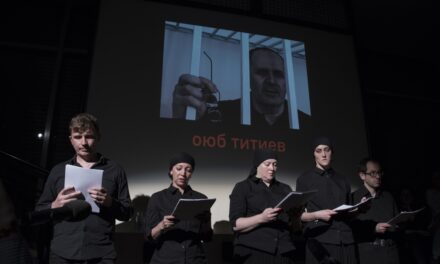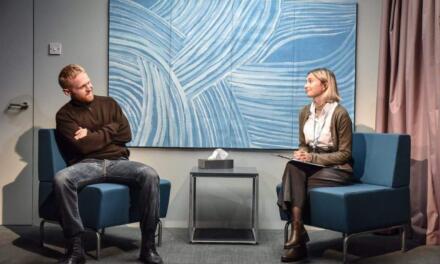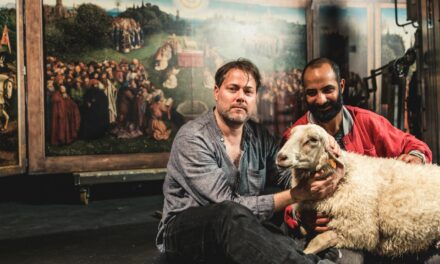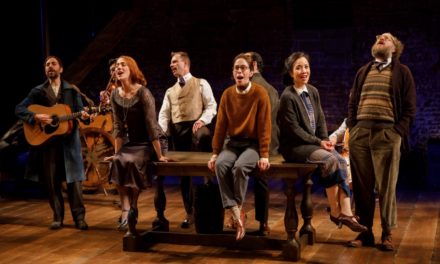Review: Sex and Death_ and the Internet, directed by Samara Hersch
My last experience as an audience of one at an Adelaide Festival show was the Belgian theatre company Ontroerend Goed’s The Smile Off Your Face in 2013.
Strapped to a wheelchair, we were led from room to room blindfolded. When the mask was taken off we were confronted with a series of unexpected and sometimes shocking encounters.
Unlike the Belgian’s wacky work, which featured multiple performers, the encounter in Sex and Death_ and the Internet is strictly between you and one other person. It is also far gentler – though no less powerful.
“Performers” here are simply people being themselves. Listed as “protagonists” in the program, the 17 seniors participating in the project possess a willingness to ask and answer some of life’s most delicate questions.
Billed as an opportunity for frank conversations, the pre-show publicity prepares us for an encounter along the lines of truth or dare, You Can’t Ask That or a Catholic confession.
To choose to participate in such an encounter with one’s self and a stranger is itself an act of self-selection.
Totally disarming
Conceived and directed by Melbourne-based performance maker Samara Hersch with key artistic collaborators Bec Reid (dramaturgy) and Ponch Hawkes (photography), participants select a time to be paired with a senior. In the weeks prior to the show participants are asked to send in a photo of themselves taken at least ten years ago.
Participants are given instructions on where to meet and told to arrive no more than 15 minutes early. Upon arrival, an attendant seats us, provides us with a headset, and asks us to listen to a short audio file with our eyes closed.
We hear children responding to a series of questions. Many answers are unexpected, even shocking in their insight, occasionally funny, and ultimately totally disarming. I find myself crying and the show hasn’t even started. Fortunately, there’s a box of tissues nearby.
A gentle, kind woman (who I later recognise as Hersch) lets me collect myself and leads me into a narrow, heavily draped, dimly lit room. Lit dramatically, I seat myself at a small desk in front of a computer monitor. Beside it sits a pad of paper. Some clear and simple verbal instructions are given.
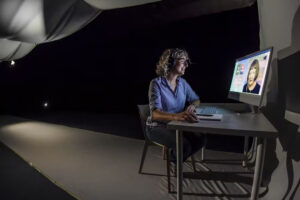
The encounter takes place alone and through a screen. Roy Vandervegt/Adelaide Festival.
What unfolds next is a face-to-face encounter with a senior at an undisclosed remote location.
After two years of COVID, we are all used to talking to people on screens.
Set up as a game, participants ask set questions of one another. Four cards linked to questions appear on the screen, and both parties can shuffle the deck for another question if it is not to their liking. Patrons have the option of passing on any question asked by their senior.
The “truth”, we are told, is “whatever it means to you today”. The process feels remarkably safe, ethical and fair, a far cry from being strapped down in a wheelchair (mind you, I loved that experience — but that’s a story for another day).
Beautiful and deeply impactful
Given that this work is still running and future iterations are likely to follow a similar format, it would be inappropriate to restate any of the questions. The truth and the willingness to tell it come from not knowing what is coming next.
These questions act to unlock our most deeply held dreams, goals and values. They have the potential to reveal both what we fear and what we cherish most.
As a newly minted “senior” myself, I came into the experience with a bit of suspicion around what someone older than I am could offer me. I expected something sweet, perhaps cute, but not particularly moving.
My human pairing in our all-too-short Q and A was beautiful and deeply impactful. What happened felt like a kind of deep communion, a sharing of what matters in life, safely revealed under the conditions of an ethics of care that Hersch and her team set up.
As for what happens with the photo, to say anything here would undermine the power of the final moments of the encounter.
Leaving the venue, I walked down the steps into the open courtyard of the Adelaide University Union building. It was 5.30pm on a Friday and the place was packed with young people: vibrant, noisy and full of energy after two years of COVID restrictions.
Usually, when walking through such a crowd I would have felt a bit old and alone. Instead, I felt connected to youth and age, even old age. And it was a good feeling, one that is still with me.
In that respect, Sex and Death_ and the Internet was less a performance event than a gift.
Sex and Death and the Internet plays at Union House, University of Adelaide, for Adelaide Festival until March 20.
This article was originally published by The Conveation on March 14, 2022, and has been reposted with permission. To read the original article, click here.
This post was written by the author in their personal capacity.The opinions expressed in this article are the author’s own and do not reflect the view of The Theatre Times, their staff or collaborators.
This post was written by William Peterson.
The views expressed here belong to the author and do not necessarily reflect our views and opinions.

